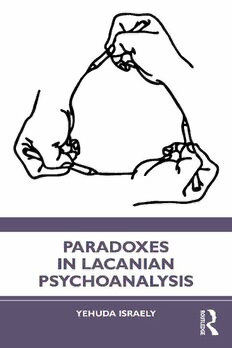
Paradoxes in Lacanian Psychoanalysis PDF
95 Pages·2021·2.833 MB·English
Most books are stored in the elastic cloud where traffic is expensive. For this reason, we have a limit on daily download.
Preview Paradoxes in Lacanian Psychoanalysis
Description:
This book explores the nature of paradoxes in Lacanian psychoanalysis, how they can be approached in treatment and how they can be resolved.Building on Freud’s and Lacan’s own work in resolving paradoxes, Yehuda Israely considers psychic distress, and its amelioration, by means of the study and clarification of the many life situations that can be described as paradoxical. Among the paradoxes examined in this book are the nature of longing (the object’s presence in its absence), the wholeness of the broken heart (the subject’s existence in relation to the lack that defines her or him), drives (the more you feed it, the hungrier it gets) and the pangs of conscience (the righteous suffer). Israely’s innovative approach considers several questions which can be used to orient treatment and focuses on shedding the erroneous beliefs and assumptions that can lead to dead ends. Paradoxes in Lacanian Psychoanalysis also explores those paradoxes – involving anxiety, perplexity, wonder and creativity – that cannot and are not meant to be resolved.This fascinating book will be essential reading for Lacanian psychoanalysts in practice and in training, and for psychoanalysts and psychotherapists of other theoretical backgrounds who are interested in understanding the nature of paradoxes.
See more
The list of books you might like
Most books are stored in the elastic cloud where traffic is expensive. For this reason, we have a limit on daily download.
